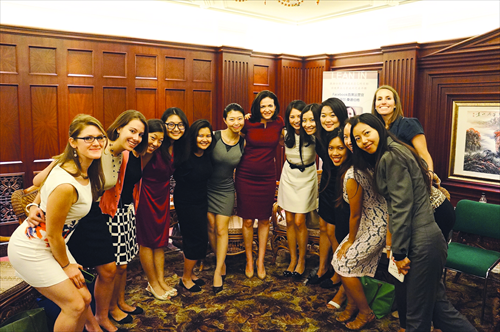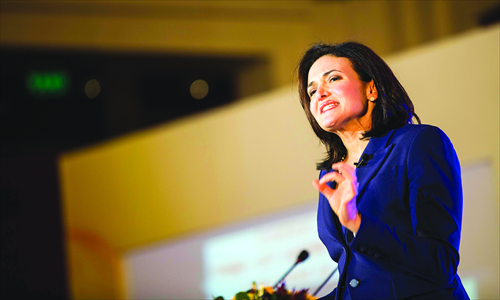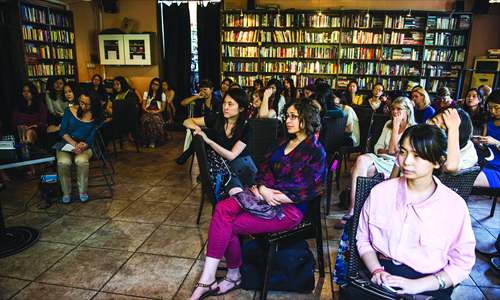Lean on me

Women from Lean In Beijing. Photo: Courtesy of Lean In Beijing

American businesswoman Sheryl Sandberg, whose book inspired the Lean In women's empowerment. Photo: CFP
Facebook chief operating officer Sheryl Sandberg was surprised when two reporters at a recent press conference promoting the Chinese edition of her bestselling book Lean In: Women, Work and the Will to Lead revealed they were also organizers of the Beijing chapter of Lean In, a global support network for women.
Operating under the principle that more can be achieved collectively than individually, around 8,000 Lean In circles, or small empowerment groups, meet regularly around the world. Members share stories of progress in their personal and professional lives and offer support to each other, with the Lean In Foundation providing agendas, discussion guides and lectures on its website.
Founded in June, Lean In Beijing's circles boast more than 120 women. But just how effectively can Sandberg's brainchild, influenced by American culture and values, help Chinese women reach their goals in a collective, Confucian society?
Forming the circle
Sandberg, ranked one of the 50 "Most Powerful Women in Business" by Fortune magazine and one of "the world's 100 most powerful women" by Forbes, had a busy agenda during her visit to Beijing in September. However, one of the most important fixtures on her itinerary was meeting with women from Lean In Beijing, an organization to help women found circles.
Sandberg's achievements as a business leader and feminist influenced women in China well before her book was published.
Most Chinese learned about Sandberg, 44, after her popular Technology, Entertainment, Design (TED) Talk titled "Why we have too few women leaders" in October 2010.
Allison Ye, 27, first watched a video of the talk in March. A few months later, she teamed up with 25-year-old American friend, Marie Reed, to establish Beijing's first Lean In circle.
"The TED Talk (by Sandberg) about women in leadership inspired me a lot," said Ye, who works for a State-owned enterprise. Ye and Reed often have conversations related to family and work. Their opinions are usually divided; Ye believes that women can balance family commitments and work, while Reed disagrees.
Before she began planning Lean In Beijing, Ye tried to persuade Reed, who had recently ended a long-term relationship, to embrace ideas about independence and ambition championed by Sandberg.
"At the time, neither of us was certain about our life or career decisions," said Reed, who works for an NGO.
Ye shared an English copy of Sandberg's manifesto with Reed, who couldn't put the book down.
"It was comforting and empowering to encounter in the book a lot of the bigger issues we were struggling with," Reed told Metropolitan in an e-mail interview. Women around the world face many similar challenges, such as trying to lead in the workplace, balance family and work commitments and find a suitable life partner, she said.
In June, Ye and Reed joined five other women to discuss members' roles and the group's structure. On August 25, Lean In Beijing held its first meeting at a Sanlitun pizza restaurant. More than 70 Chinese and foreign women, mostly friends and acquaintances of the organizers, attended to share their stories and ideas.
The meeting was divided into two parts. To break the ice, attendees split into 10 small groups and familiarized themselves through a four-minute question and answer session. In the second part, groups discussed workplace and life issues before a representative from each group summarized findings to everyone.
The theme of the organization's second event was "women in journalism," which drew professionals working in Beijing and university students aspiring to enter the field.

Women attend an event in September hosted by Lean In Beijing. Photo: Li Hao /GT
Sisters are doing it for themselves
Sandberg became aware of Lean In Beijing from the foundation's website (leanin.org), which serves as an online meeting place for circles around the world to share stories and experiences. In July, Reed contacted the Palo Alto, California headquarters of the Lean In Foundation to let them know about the Beijing group.
"Sandberg was glad to know ideas from her book were being passed on, and really keen to communicate with her Beijing followers," said Ye, who met the author in September. Sandberg was interested in making Lean In circles in China more localized, given the cultural differences between the US and China.
One of the biggest problems facing Chinese women is that employers are more likely to lean away from them when they show signs of ambition. This is particularly the case at State-owned enterprises and in the civil service, where salaries and promotions depend more on seniority rather than workplace performance.
"It is impossible for me to ask my boss for a pay rise. It's just something that would never work," said Ye.
Pressure facing 'leftover' women
During her press conference, Sandberg asked organizers of Lean In Beijing if they had conducted surveys to learn what local women care most about and how this compares to women in other circles around the world.
Lean In Beijing carried out its first survey in July to determine the most pressing career, family and personal issues facing Chinese women. The survey, which has not yet been published, received responses from more than 400 women aged between 18 and 44, with around 15 percent of respondents answering in English.
The survey found "caring for parents" ranked third in an index measuring happiness among Chinese surveyed, although the same category polled among the lowest concerns with respondents who answered in English.
Ye said these differences highlight conflicting priorities between women in China and the West, which explains how various "responsibilities influence our career choices."
Further intensifying pressure on young Chinese women is the social stigma that comes from being a shengnü - an unmarried woman aged 27 or over, derogatorily dubbed "leftover." At Lean In Beijing's first event, organizers found women were particularly concerned about this issue.
As an outsider, Reed said she is aware of pressure Chinese women face from their families and society to marry, even if it comes at the cost of their own education or career development. A male Chinese friend once advised her not to pursue her PhD studies because he worried it would jeopardize her chances of finding a future husband, Reed recalled.
"The advice that I get from my parents is to not marry so early," she said, insisting that financial independence and a better understanding of one's self ultimately "contribute to a stronger, more lasting marriage."
Leveling the gender playing field
Maggie Zhang (pseudonym), 24, found out about Lean In Beijing's first event from a friend on mobile messaging app WeChat. "I decided to come because I like having conversations with female friends," said Zhang, who hasn't read Sandberg's book.
Zhang, who works at an accounting firm, said she sought guidance from the circle to help navigate her own career crossroads. She worried about the implications of job hopping, but knew she needed to find employment that better suited her personality.
"Discussions in the circle helped me to be more open-minded," she said. "I was inspired by others' life experiences. One woman said she now had a job she was passionate about after quitting her last one because she didn't enjoy it. Another woman chose to study abroad to give her career, which had reached a bottleneck, a chance to restart."
Feng Yuan, director of the Center for Women's Studies at Shantou University in Guangdong Province, attended a Lean In Beijing event in September. She said such empowerment groups help "spread the social capital of women" in society.
"It is kind of like an intimate sisterhood," Feng said, noting it was an unusual phenomenon because "Chinese culture doesn't encourage people to share and speak" about private issues.
One of the main criticisms of Sandberg's book is that the billionaire businesswoman's philosophy is hardly relevant to working mothers or, in China's case, women who are pressured to walk down the aisle before advancing their careers.
But Feng agrees with Sandberg's main campaign for greater gender equality. "Women should understand they are not rivals to each other," Feng said. "We can only be empowered when we are side by side, fighting for an equal social environment."
While Facebook might be blocked in China, Sandberg's Lean In Foundation is expanding its reach in the country amid plans to launch a Chinese version of its website. Reed and Ye said they will continue to hold more events on a regular basis, even though organizing meetings and activities is proving to be a demanding job.
"Most of us have full-time jobs, and there are so many exciting things we want to do to help spread the [Lean In] message to Chinese women. Our new challenge is striking a balance between our work and the Lean In project," Ye said.